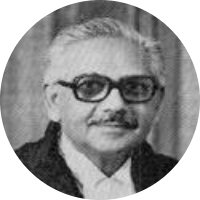J.S. Verma

J.S. Verma
Former Chief Justice of India
Assumed Office25th Mar, 1997
Retired On17th Jan, 1988
Previously
Chief Justice of the Rajasthan High Court September 1st 1986
Chief Justice of the Madhya Pradesh High CourtJune 14th 1986 - August 31st 1986
Permanent Judge of the Madhya Pradesh High CourtJune 2nd 1973 - June 13th 1986
Additional Judge of the Madhya Pradesh High CourtSeptember 12th 1972 - June 1st 1973
Profile
Born on January 18th 1933, Jagdish Sharan Verma enrolled as an advocate in August 1959 in the Madhya Pradesh High Court. His primary practice was regarding constitutional, civil, criminal, taxation and revenue matters.
On September 12th 1972, he was appointed as an Additional Judge of the Madhya Pradesh High Court and eventually became a permanent Judge on June 2nd 1973. During his High Court tenure, he also acted as a Chairman for Advisory Boards constituted under the National Security Act and headed the Administrative Committee of the Madhya Pradesh High Court. On October 27th 1985, he was appointed acting Chief Justice of the Madhya Pradesh High Court and was soon after made permanent Chief Justice on June 14th 1986. He also served as the Chief Justice of the Rajasthan High Court when he was transferred on September 1st 1986. During his time in office, he acted as the Governor of Rajasthan twice between 1986 and 1989. On June 3rd1989, Justice Verma was elevated to the position of a Supreme Court judge and was appointed the 27th Chief Justice of India on March 25th 1997 and served in that capacity until his retirement on January 18th 1998.
During his time in the apex court, Justice Verma authored 149 judgments and was a part of 639 benches.
Notable Judgements
In Sarojini Ramaswamy v. UOI, the Supreme Court was confronted with the question of whether or not the impeachment of a Supreme Court Judge by the order of a president came under the scope of a judicial review. In the decision authored by Justice Verma the court found that under Article 124, the provision dealing with the impeachment of Supreme Court judges, a judge may be impeached only on grounds of proved misbehaviour or incapacity and thus ruled that the President’s order to impeach did come under the scope of Judicial Review.
In Smt. Nilabati Behera Alias Lalit Behera v. the State of Orissa, a bench was constituted to decide if the Court was empowered to exercise its writ jurisdiction under Article 32 of the Constitution of India to grant relief in a case where a person was alleged to have died as a consequence of the injuries inflicted on him whilst in police custody. Justice Verma ruled in favour of the relative of the deceased and ordered that compensation be provided.
In S. R. Bommai v. India, the Bench was required to determine the scope of the powers of the President concerning imposing the President’s rule under Article 356. The bench found that the President’s power in this regard was not absolute and that the President could only act under this provision if the proclamation of imposing President’s rule was approved by both Houses of Parliament. The Court also ruled that the power of the President under Article 356 was subject to judicial review.
In Vishaka v. State of Rajasthan, Justice Verma authored a judgment that provided a set of guidelines to prevent sexual harassment at the workplace. The court decided that this set of guidelines were to be mandatorily followed till Parliament enacted the Criminal Law Amendment Act 2013.
In Ismail Faruqui v. Union of India (also known as the Ayodhya dispute), Justice Verma formed a part of the majority and upheld the constitutional validity of the Acquisition of Certain Area at Ayodhya Act, 1993. It was this Act that the Central Government had used to acquire the disputed land till the adjudication of the dispute was completed. It was observed that no step taken by the Government to halt communal tension could be considered non-secular.
